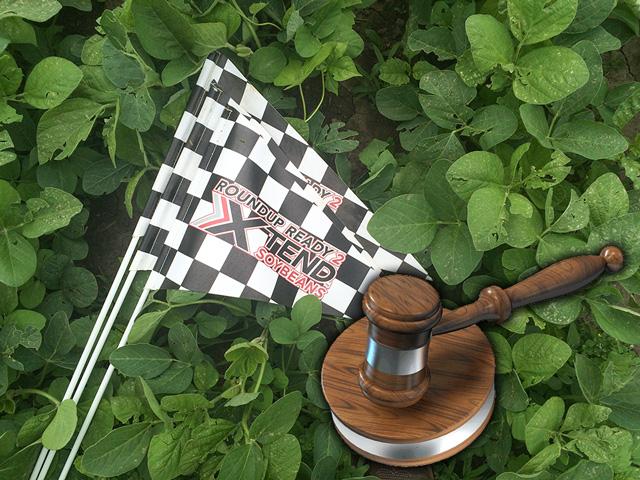Saved Seed Lands MO Farmers in Court
Bayer Sues Six Missouri Farmers for Allegedly Saving Roundup Ready 2 Xtend Soybean Seed
JEFFERSON CITY, Mo. (DTN) -- Six farmers from southeast Missouri find themselves at odds with Bayer CropScience after allegedly saving and subsequently planting soybean seed that contained the company's Roundup Ready 2 Xtend technology.
Bayer also alleges that four of the six growers illegally applied dicamba formulations not approved for over-the-top (OTT) use on Xtend soybeans and did so after the June 30 cutoff date for OTT dicamba application set by EPA and the state of Missouri.
In complaints filed in late January with the U.S. District Court for the Eastern District of Missouri in St. Louis, Bayer claimed the Bootheel farmers' alleged actions infringe upon its patents and breach the terms of contracts and technology stewardship agreements (TSAs) the farmers signed. The company seeks damages and a permanent injunction against the farmers to prevent future infringements on patented technologies.
In response to DTN's request for comment on the lawsuits, a Bayer spokesperson wrote that "deciding to pursue litigation against growers is not easy for us. We exist to serve and support growers. The vast majority of growers abide by the law and honor their contractual agreements. In these cases, there was clear evidence of irresponsible and illegal use.
"Illegal use threatens law-abiding growers' access," the spokesperson wrote. "These lawsuits are about ensuring proper use of the technologies and protecting grower access to the technologies."
P[L1] D[0x0] M[300x250] OOP[F] ADUNIT[] T[]
The farmers named in the lawsuits include Caleb Duffy, Greg Duffy, Michael J. Hodel and Brian G. Irions, all of Hayti, Missouri; Robert O. Pierce Jr. of Caruthersville, Missouri; and Danny Glass of Wardell, Missouri. All grew soybeans in Pemiscot County. The complaints of illegal application of unapproved dicamba formulations after the OTT dicamba cutoff date were lodged against the four farmers from Hayti only.
In February, all six farmers filed a separate answer to Bayer's complaint in which they denied all allegations and demanded a jury trial. Wendell L. Hoskins II, an attorney from Caruthersville, Missouri, represents the farmers. DTN reached out to Hoskins by phone and email seeking comment on behalf of his clients but received no return call or reply.
The six lawsuits are the most recent in a string of legal actions since the mid-1990s when the Monsanto Co. -- which Bayer acquired in 2018 -- first sued farmers who saved and replanted its glyphosate-tolerant Roundup Ready seed. Though hundreds of lawsuits have been filed, very few have made it to trial. In those that have, courts have found in favor of the agriculture biotechnology company.
When Bayer's dicamba-tolerant Xtend soybeans were introduced in 2016, EPA had not yet approved OTT dicamba formulations. Some growers, anxious to take advantage of the new technology to combat herbicide-resistant weeds, sprayed older, unapproved dicamba products anyway, leading to off-target movement and crop damage. Such issues led EPA to amend registrations for all OTT dicamba products in 2017, 2018 and again in 2020 after the 9th U.S. Circuit Court of Appeals vacated the 2018 registrations on the basis that "EPA substantially understated risks that it acknowledged and failed entirely to acknowledge other risks."
The new EPA registrations in 2020 for three OTT dicamba products included new measures intended to prevent off-target movement and damage to nontarget crops and other plants. Despite these measures, dicamba-related incidents have continued.
In its complaints against the Duffys, Hodel and Irions, Bayer claims the defendants' alleged illegal applications of unapproved dicamba formulations have made it more difficult for the company to continue obtaining registrations for XtendiMax, its OTT dicamba formulation, while also contributing to more restrictive application conditions for the product. Last month, EPA amended OTT dicamba labels in Illinois, Indiana, Iowa and South Dakota, shortening the application window in each state.
"We cannot say for sure how much of the reported off-target movement can be attributed to illegal use of unapproved dicamba products, but we can say for sure that using the unapproved dicamba products over the top is significantly more likely to cause off-target movement," Bayer said in an email to DTN. "Notably, there have been more reports of dicamba off-target movement in southeast Missouri than in most other parts of the country in recent years."
According to the Missouri Department of Agriculture, it received 38 complaints of alleged dicamba damage in 2022. For comparison, that number exceeded 300 cases in the Show-Me State in 2017.
The six lawsuits are moving independently through the judicial process. The most recent action occurred on March 24 when the parties filed a joint proposed scheduling plan for the complaint against Michael J. Hodel. The document reveals that both parties believe that referring the case to mediations would be appropriate; the earliest date by which the case would reasonably be expected to be ready for trial would be Sept. 30, 2024.
The Bayer spokesperson wrote that any money collected from these growers will be donated back into agriculture communities to support youth programs and other important local agriculture initiatives.
Jason Jenkins can be reached at jason.jenkins@dtn.com
Follow him on Twitter @JasonJenkinsDTN
(c) Copyright 2023 DTN, LLC. All rights reserved.





